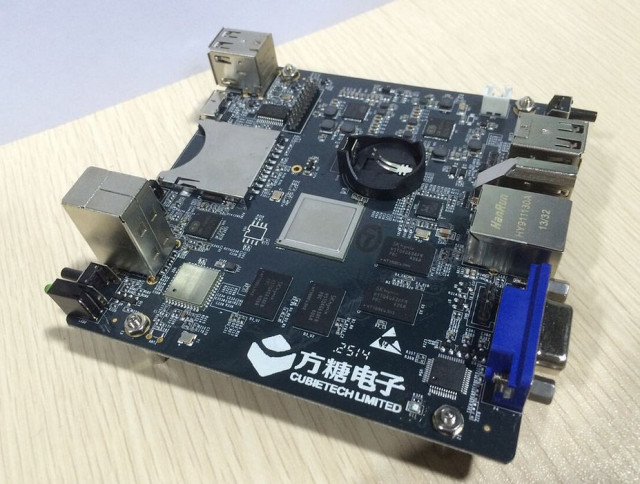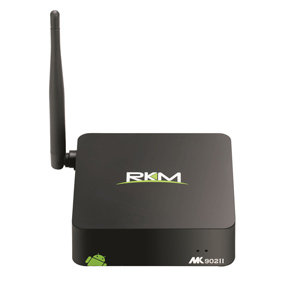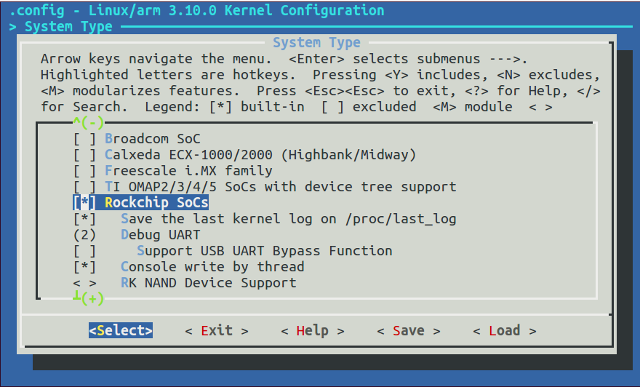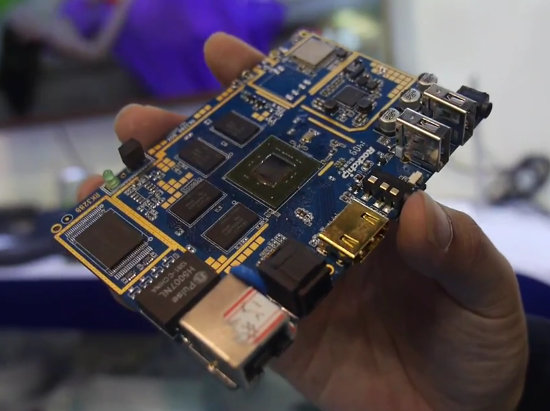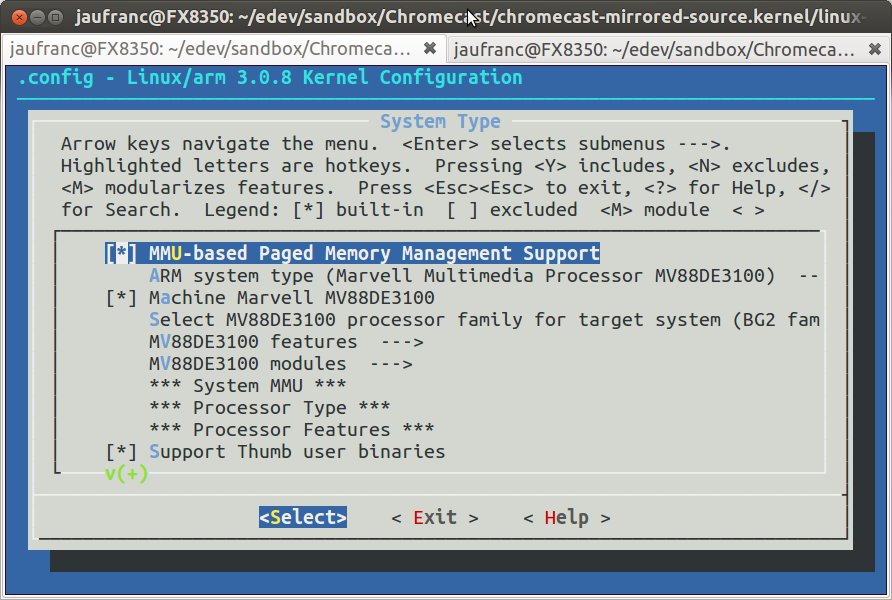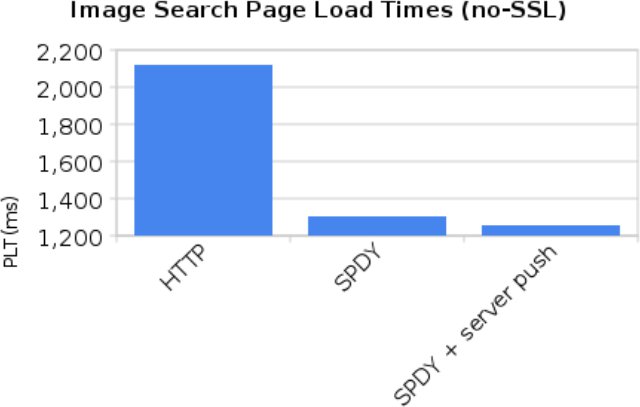Back in April, AllWinner announced partnerships with Linksprite and CubieTech for respectively PcDuino 8 and Cubieboard 8 development boards to feature AllWinner A80 octa core ARM Cortex 15/A7 big.little SoC. However, at the time all we got was some photo-shopped pictures of older versions of the boards with an A80 processor pasted by graphics designers. Some pictures of Cubieboard 8 have now surfaced, and they are clear enough so that we can start to get most of the specs. Here are Cubieboard 8 specifications derived from the pictures (incomplete because we don’t have pictures of the back of the board): SoC – AllWinner A80 octa core big.LITTLE processor with 4 ARM Cortex A15 cores, 4 Cortex A7 cores, and Imagination PowerVR G6200 GPU System Memory – 2GB DDR3 (4x SKhynix H5TQ4G83AFR – 4Gbit RAM chips) – TBC in case they’ve added more RAM chips at the back, unlikely IMHO. Storage […]
Rikomagic MK902 II Android TV Box with Rockchip RK3288 Coming Soon
Rikomagic MK902 is an Android mini PC powered by Rockchip RK3188 quad core processor, and there’s even a Linux version. The company has announced it has been working on an upgrade of the device named MK902 II, and powered by Rockchip RK3288. It will initially sell with Android, but I would not be surprised with a PicUntu version is also sold later, and even an MK 902 II Chromebox could hit the market, since Rockchip released Chromium OS overlay files for RK3288. They’ve also provide MK902 II specifications: SoC – Rockchip 3288 quad core ARM Cortex A17 up to 1.8 GHz with Mali-T764 GPU System Memory – 2G DDR3 Storage – 8 or 16 GB flash + micro SD slot (up to 32GB) Video Output – HDMI, AV Audio Output / Input – HDMI, stereo audio (via AV port), optical S/PDIF, microphone Video Codecs – MPEG-1, MPEG-2, MPEG-4, H.263, H.264, […]
Linux Kernel Source Code and Chromium OS Overlay for Rockchip RK3288
A few days ago, we’ve seen Chromium OS running on Rockchip RK3288 development platform. I’ve been informed the source code could have already been released via the newly registered rkchrome github account with Linux kernel 3.10.30 and the overlay files to build Chromium OS for RK3288. There’s also a u-boot repository but it is currently empty. This Linux kernel can also boot Rockchip RK3188 based Radxa Rock development board, but more tests are needed to see if it’s really usable. I’ll have a look at the Linux kernel, and try to build it, and leave the Chromium OS part for later or other people. Let’s retrieve the source code:
|
1 2 |
git clone https://github.com/rkchrome/kernel.git cd kernel |
We’ve got two kernel config files related to Rockchip in arch/arm/config:
|
1 2 3 |
ls arch/arm/configs/ | grep rock rockchip_chromium_defconfig rockchip_defconfig |
But since this is a recent 3.10 kernel with support for Flattened Device Tree support, and multi-platform support, there’s not much to be seen in these files, and […]
Rockchip RK3288 based Android and Chromium OS Tablets and TV Boxes (Video)
After the first RK3288 Android TV boxes started to be promoted on Alibaba, and the first RK3288 board was shown, Rockchip is currently showing their quad core Cortex A17 processor in reference designs, tablets, and TV boxes running Android or Chromium OS at the Hong Kong Electronics Fair. Charbax interviewed the company, and the first demo was a development board connected to an LCD display running Chromium OS, which is said to handle 30 tabs without issues. Rockchip RK3288 is now advertised as being a quad core Cortex A17 with a Mali-T764 GPU, but when Rockchip representative was asked, he strangely denied to comment on whether it was a Cortex A12 or A17, as both are very similar. He also said the GPU was a Mali-T760MP4… If this seems all confusing that’s because it is… Some interesting things are H.265/HEVC support for 4K2K videos, and HDMI 2.0 for 4K @ […]
Chromecast Open Source Code: Linux Kernel, Toolchain, Bootloader, and More
Google has made quite a stir by introducing Chromecast, and entering the HDMI TV Stick market. We already know the device is based on Marvell 88DE3005 SoC with 512 MB, and since the product are already been shipped to customers in the US, it was just a question of time before the release of the open source code, and everything you need appears to be available at https://code.google.com/p/chromecast-mirrored-source/ Let’s have a look at what we have in the different repositories: Wiki – Empty… Kernel – Linux 3.0.8 source code Prebuilt – Binary toolchain: arm-unknown-linux-gnueabi-4.5.3-glibc Toolchain – Source code for the toolchain above. External – Source code for alsa-libs, dnsmask, libexit and nss sdk – bootloader and DirecFB 1.6.1 vendor – Looks like qt source used in some netflix app (not sure) Chromium – README explaining how you can download Chromecast Chromium source code: 1.8GB tarball + you need to contact […]
Building Chromium OS for Raspberry Pi (ARMv6)
I had previously written the instructions to build an older version of Chromium (via Berkelium) for ARM using Beagleboard/Overo rootfs in order to use it with Xibo digital signage. Recently I’ve been contacted by hexxeh, who maintains Chromium OS vanilla builds for x86 and MacOS computer, as he intends to provide Chromium OS for the Raspberry Pi, and you should be able to get a SD card image once everything is working from the site above. Today, I’ll post the steps followed to build Chromium OS LKGR (“the latest revision to pass only unit tests”) optimized for ARMv6 processor with soft-float support, which is the type of processor (Broadcom BCM2835) used in the Raspberry Pi. Please note that although it can build, it still does not run properly and a few more changes are needed. First, you’ll need a fast machine to build Chromium OS in a reasonable amount of […]
Daisy: An Exynos 5250 (Cortex A15) Based ChromeBook
Thomas Taschauer has reported on his blog that Google was working on several Chromebooks including one codenamed “Daisy” powered by an an ARM chip by just looking at Chromium OS’ issue tracker. By looking more into details, we can find out that Daisy development makes use of the kernel config for Samsung SMDK5250, Samsung development board for the Exynos 5250 (Dual Core Cortex A15) processor. Daisy also appears to have an Ethernet port, a feature not seen on other Chromebooks which only feature WiFi or 3G for connectivity. Jean-Luc Aufranc (CNXSoft)Jean-Luc started CNX Software in 2010 as a part-time endeavor, before quitting his job as a software engineering manager, and starting to write daily news, and reviews full time later in 2011. www.cnx-software.com
SPDY Aims to Make the Web Faster and Replace HTTP
SPDY (pronounce “SPeeDY”) is a new protocol designed by Google that aims at making the web faster and eventually replace HTTP. This new protocol is not a new scheme, so it would be transparent to the user and there would not be a new spdy:// prefix and we would still be using http://. It will always be secure and use tcp port 443 instead of 80 (because of transparent proxies messing up with packets). Most of Google products such as Chrome, Android Honeycomb (They can’t say if ICS is using SPDY…) devices and Google’s servers have already using SPDY protocol for some time, and Google reports some encouraging results. The tested 300 sites from the top 1000 Alexa sites and found an average 40% page load improvement. They also reported some labs tests: *PLT stands for “Page Load Times” in the chart above. Google is not the only company using […]


